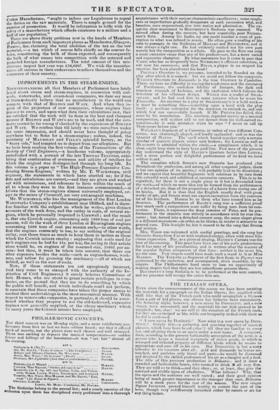IMPROVEMENTS IN THE STEAM-ENGINE.
NOTWITHSTANDING all that Members of Parliament have lately heard about steam and steam-engines, in connexion with rail- roads, waterworks, and steam-boat companies, we dare say most of them4potently believe that no manufactory in the world can compete with that of BOLTON and Warr. And when they in- quire of the projectors of new companies, whose engines they proroie to erect, and upon what data their calculations rest, they are satisfied that the work will be done in the best and cheapest manner if BOLTON and WATT'S are to be used, and that the esti- mates cannot be far wrong if checked by the experience of BOLTON and WATT. We confess that till lately we were ourselves under the same impression, and should never have thought of going anywhere but to Soho for a steam-engine ; unless, indeed, the proximity of MAUDSLEY and FIELD'S splendid factory, on the " Surry side," had tempted us to depart from our allegiance. But we have been reading the first volume of the Transactions of the Society of Civil Engineers,—a handsome volume, appropriately embellished with a portrait of the late THOMAS TELFORD, exhi- biting that combination of acuteness and solidity of intellect for which the original was distinguished through his long life. In this volume is a paper on " The High-Pressure Expansive Con- densing Steam-Engines," written by Mr. T. W ICKSTEED, civil engineer, the statements in which have startled us; for if the data and calculations are correct,—and they are given and worked out with minuteness, and reference to facts within the reach of all to whom they were in the first instance communicated,—it follows that the steam-engines almost universally employed, ex- cept in the mines of Cornwall, are very extravagant machines. Mr. WICKS-FEED, who has the management of the East London Waterworks Company's establishment near Oldford, and is there- fore familiar with the subject on which he writes, gives distinct accounts of the work done, and the outlay in coals, of several en- gines, which he personally inspected in Cornwall ; and the result is, that one Cornish engine, consuming only 1000 tons of coal per annum, will do the work of three London or Birmingham engines consuming 1000 tons of coal per annum each,—in other words, that the engines commonly in use, to say nothing of the original outlay, cost three times as much to keep them in motion as those which the Cornish miners employ : supposing that coals used for such engines can be had fur 18s. per ton, the saving in that article alone would be, on engines of the assumed size, 1800/. per an- num: but then, it must be taken into account, that there are other expenses besides the coals—such as engine-houses, work- men, and tallow for greasing the machinery—all of which are trebled, as well as the cost of coals.
Now, if these statements are riot egregiously incorrect, (and they come to us stamped with the authority of the In- stitution of Civil Engineers,) it surely behoves Committees of both Houses, who are about to grant certain privileges to com- panies, on the ground that they are to do something by which the public will benefit, and which individuals could not perform, to ascertain that these companies have taken the proper means to conduct their undertakings in the most economical manner. With respect to waterworks companies, in particular, it should be ascer. tained whether they propose to use the old-fashioned, expensive engines now generally supplied, or the cheap machinery which fur many years the Cornish miners have employed.


























 Previous page
Previous page